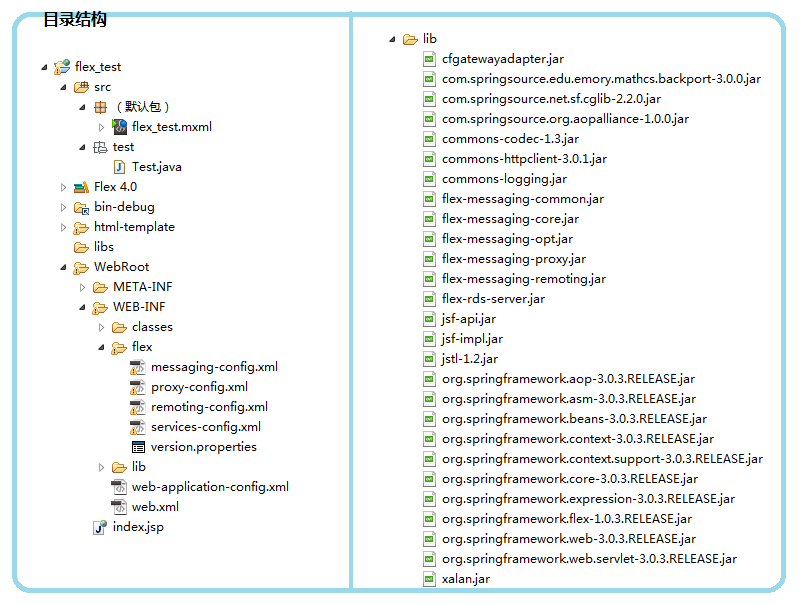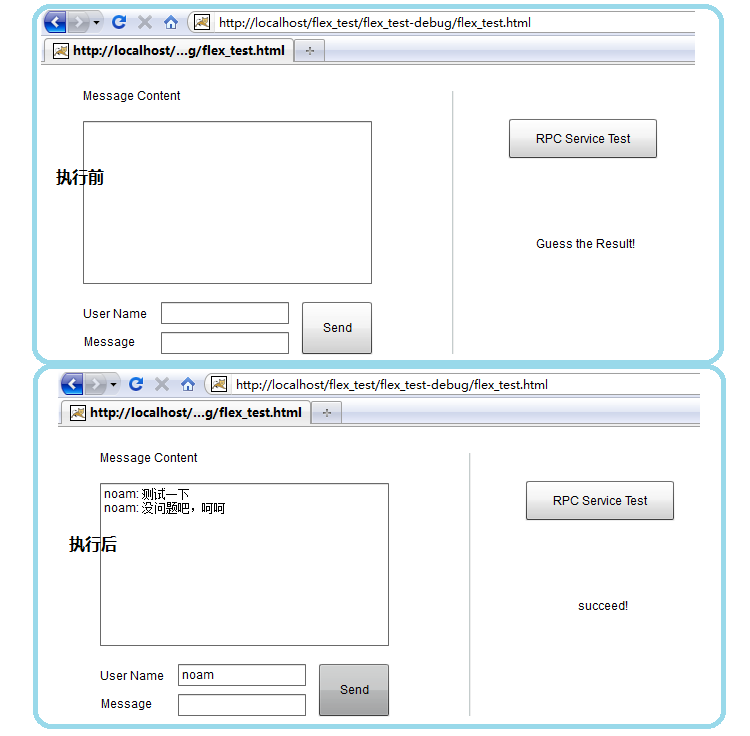环境:
MyEclipse 7.5
Flash Builder 4 plugin for eclipse
Tomcat 6
BlazeDS 4.0.0
springframework 3.0.3
Spring-flex整合 org.springframework.flex-1.0.3.RELEASE.jar (适用于spring2.5.6+,blazeds3.2+)
步骤:
1. 创建带有Flex支持的Web工程,见通过J2EE Web工程添加Flex项目,进行BlazeDS开发。
2. 导入spring包和spring-flex集成包。
3. 配置web.xml,配置DispatcherServlet,使用spring进行管理,并将请求映射到MessageBroker。
4. 创建web-application-config.xml,配置flex服务,主要是在spring中配置MessageBroker。
5. 创建remoting-destination和 message-destination,修改channel属性。
6. 创建mxml文件,定义channelSet,注册remote-object和定义Productor, Consumer.
注意:
当不使用spring直接配置blazeDS实现RPC和消息服务时,仅需要在remoting-config.xml和messaging-config.xml中配置destination,只要在这些文件中配置了默认通道,mxml文件中不需要再定义channelSet即可执行。而使用spirng时,仅当将default-channels定义在services-config.xml的services标签中才有效,若在services-config.xml的services标签中加载其他配置文件,在这些文件中配置各自的default-channels,会报如下错误:[MessagingError message='×××'artgallerydataservice' either does not exist or the destination has no channels defined (and the application does not define any default channels.)'],原因是没有找到通道。如果仅将通道定义在<flex:message-destination>或<flex:remoting-destination>中,也会出现同样的情况。
对于以上的两个问题,我觉得几乎不可理解,解决方案是在mxml文件中定义channelSet以找到amf通道。
项目代码:
目录结构:

Web.xml:
web.xml
<?xml version="1.0" encoding="UTF-8"?>
<web-app version="2.4"
xmlns="http://java.sun.com/xml/ns/j2ee"
xmlns:xsi="http://www.w3.org/2001/XMLSchema-instance"
xsi:schemaLocation="http://java.sun.com/xml/ns/j2ee
http://java.sun.com/xml/ns/j2ee/web-app_2_4.xsd">
<servlet>
<servlet-name>Spring MVC Dispatcher Servlet</servlet-name>
<servlet-class>org.springframework.web.servlet.DispatcherServlet</servlet-class>
<init-param>
<param-name>contextConfigLocation</param-name>
<param-value>/WEB-INF/web-application-config.xml</param-value>
</init-param>
<load-on-startup>1</load-on-startup>
</servlet>
<servlet-mapping>
<servlet-name>Spring MVC Dispatcher Servlet</servlet-name>
<url-pattern>/messagebroker/*</url-pattern>
</servlet-mapping>
<welcome-file-list>
<welcome-file>index.jsp</welcome-file>
</welcome-file-list>
</web-app>
web-application-config.xml:
<flex:message-broker/>是非常重要的,它还有其它的几种表示方法,但以这种最为简单,它通过MessageBrokerHandlerAdapter和HandlerMapping将请求发送给spring管理的MessageBroker。
注意这里一定要导入spring-flex集成的schemaLocation,remoting-destination和 message-destination也在这里定义。
web-application-config.xml
<?xml version="1.0" encoding="UTF-8"?>
<beans xmlns="http://www.springframework.org/schema/beans"
xmlns:flex="http://www.springframework.org/schema/flex"
xmlns:xsi="http://www.w3.org/2001/XMLSchema-instance"
xsi:schemaLocation="
http://www.springframework.org/schema/beans
http://www.springframework.org/schema/beans/spring-beans-2.5.xsd
http://www.springframework.org/schema/flex
http://www.springframework.org/schema/flex/spring-flex-1.0.xsd">
<flex:message-broker/>
<flex:message-destination id="msg_dest"/>
<bean id="flex_test" class="test.Test">
<flex:remoting-destination/>
</bean>
</beans>
services-config.xml:
这里最重要的是channels的定义和配置。
services-config.xml
<?xml version="1.0" encoding="UTF-8"?>
<services-config>
<services>
<default-channels>
<channel ref="my-amf"/>
</default-channels>
</services>
<security>
<login-command class="flex.messaging.security.TomcatLoginCommand" server="Tomcat"/>
<!-- Uncomment the correct app server
<login-command class="flex.messaging.security.TomcatLoginCommand" server="JBoss">
<login-command class="flex.messaging.security.JRunLoginCommand" server="JRun"/>
<login-command class="flex.messaging.security.WeblogicLoginCommand" server="Weblogic"/>
<login-command class="flex.messaging.security.WebSphereLoginCommand" server="WebSphere"/>
-->
<!--
<security-constraint id="basic-read-access">
<auth-method>Basic</auth-method>
<roles>
<role>guests</role>
<role>accountants</role>
<role>employees</role>
<role>managers</role>
</roles>
</security-constraint>
-->
</security>
<channels>
<channel-definition id="my-amf" class="mx.messaging.channels.AMFChannel">
<endpoint url="http://{server.name}:{server.port}/{context.root}/messagebroker/amf" class="flex.messaging.endpoints.AMFEndpoint"/>
</channel-definition>
<channel-definition id="my-secure-amf" class="mx.messaging.channels.SecureAMFChannel">
<endpoint url="https://{server.name}:{server.port}/{context.root}/messagebroker/amfsecure" class="flex.messaging.endpoints.SecureAMFEndpoint"/>
<properties>
<add-no-cache-headers>false</add-no-cache-headers>
</properties>
</channel-definition>
<channel-definition id="my-polling-amf" class="mx.messaging.channels.AMFChannel">
<endpoint url="http://{server.name}:{server.port}/{context.root}/messagebroker/amfpolling" class="flex.messaging.endpoints.AMFEndpoint"/>
<properties>
<polling-enabled>true</polling-enabled>
<polling-interval-seconds>1</polling-interval-seconds>
</properties>
</channel-definition>
<!--
<channel-definition id="my-http" class="mx.messaging.channels.HTTPChannel">
<endpoint url="http://{server.name}:{server.port}/{context.root}/messagebroker/http" class="flex.messaging.endpoints.HTTPEndpoint"/>
</channel-definition>
<channel-definition id="my-secure-http" class="mx.messaging.channels.SecureHTTPChannel">
<endpoint url="https://{server.name}:{server.port}/{context.root}/messagebroker/httpsecure" class="flex.messaging.endpoints.SecureHTTPEndpoint"/>
<properties>
<add-no-cache-headers>false</add-no-cache-headers>
</properties>
</channel-definition>
-->
</channels>
<logging>
<target class="flex.messaging.log.ConsoleTarget" level="Error">
<properties>
<prefix>[BlazeDS] </prefix>
<includeDate>false</includeDate>
<includeTime>false</includeTime>
<includeLevel>false</includeLevel>
<includeCategory>false</includeCategory>
</properties>
<filters>
<pattern>Endpoint.*</pattern>
<pattern>Service.*</pattern>
<pattern>Configuration</pattern>
</filters>
</target>
</logging>
<system>
<redeploy>
<enabled>false</enabled>
<!--
<watch-interval>20</watch-interval>
<watch-file>{context.root}/WEB-INF/flex/services-config.xml</watch-file>
<watch-file>{context.root}/WEB-INF/flex/proxy-config.xml</watch-file>
<watch-file>{context.root}/WEB-INF/flex/remoting-config.xml</watch-file>
<watch-file>{context.root}/WEB-INF/flex/messaging-config.xml</watch-file>
<watch-file>{context.root}/WEB-INF/flex/data-management-config.xml</watch-file>
<touch-file>{context.root}/WEB-INF/web.xml</touch-file>
-->
</redeploy>
</system>
</services-config>
messaging-config.xml, proxy-config.xml, remoting-config.xml:
略。和blazeDS提供的几乎一样。
test.Test.java:
这里只定义了一个方法,用以测试远程方法调用。
package test;
public class Test {
public void done(){
System.out.println("OK.");
}
}
flex_test.mxml:
这个不做过多解释。 这里定义了AMFChannel和ChannelSet,避免找不到通道的问题。Productor和Consumer是实现BlazeDS消息服务的两个组件,AsyncMessage是用来发送消息的。
flex_test.mxml
<?xml version="1.0" encoding="utf-8"?>
<s:Application xmlns:fx="http://ns.adobe.com/mxml/2009"
xmlns:s="library://ns.adobe.com/flex/spark"
xmlns:mx="library://ns.adobe.com/flex/mx" minWidth="955" minHeight="600"
creationComplete="consumer.subscribe();">
<fx:Script>
<![CDATA[
import mx.controls.Alert;
import mx.messaging.messages.*;
import mx.messaging.events.*;
import mx.rpc.events.FaultEvent;
import mx.rpc.events.ResultEvent;
// Write received message to TextArea control.
private function messageHandler(event: MessageEvent):void {
ta.text += event.message.body + "\n";
}
// Compose the message as an instance of AsyncMessage,
// then use the Producer.send() method to send it.
private function sendMessage():void {
var message: AsyncMessage = new AsyncMessage();
message.body = userName.text + ": " + msg.text;
producer.send(message);
msg.text = "";
}
protected function button_clickHandler(event:MouseEvent):void
{
// TODO Auto-generated method stub
object.done();
}
protected function resulth(event:ResultEvent):void
{
label.text="succeed!";
}
protected function faulth(event:FaultEvent):void
{
label.text="failed!";
Alert.show("远程对象调用失败:\n"+event.fault);
}
]]>
</fx:Script>
<fx:Declarations>
<!-- 将非可视元素(例如服务、值对象)放在此处 -->
<mx:AMFChannel id="polling_amf" url="../messagebroker/amfpolling" />
<mx:ChannelSet id="polling_channel" channels="{[polling_amf]}" />
<mx:AMFChannel id="amf" url="../messagebroker/amf" />
<mx:ChannelSet id="amf_channel" channels="{[amf]}" />
<mx:Producer id="producer" destination="msg_dest" channelSet="{polling_channel}"/>
<mx:Consumer id="consumer" destination="msg_dest" channelSet="{polling_channel}"
message="messageHandler(event)"/>
<mx:RemoteObject id="object" destination="flex_test"
channelSet="{amf_channel}"
result="resulth(event);" fault="faulth(event);" />
</fx:Declarations>
<s:TextArea x="42" y="56" width="289" height="163" id="ta"/>
<s:Label x="42" y="244" text="User Name"/>
<s:Label x="43" y="272" text="Message"/>
<s:TextInput x="120" y="237" width="128" id="userName"/>
<s:TextInput x="120" y="267" id="msg"/>
<s:Button x="261" y="237" label="Send" height="52" click="sendMessage();"/>
<s:Label x="42" y="26" text="Message Content"/>
<mx:VRule x="411" y="26" height="263"/>
<s:Button x="468" y="54" label="RPC Service Test" width="148" height="39" id="button" click="button_clickHandler(event)"/>
<s:Label y="140" text="Guess the Result!" verticalAlign="middle" textAlign="center" width="177" height="79" x="456" id="label"/>
</s:Application>
执行结果:

